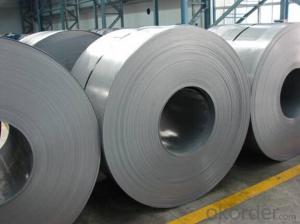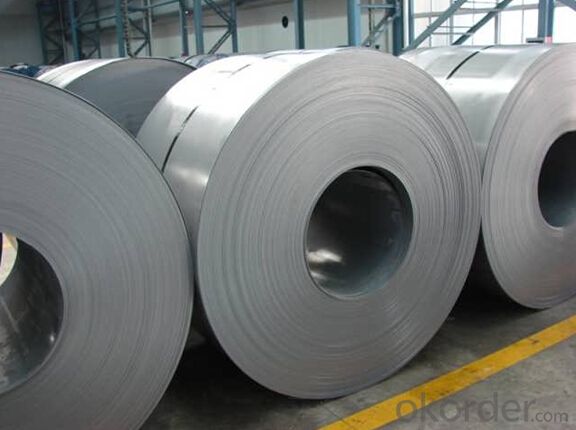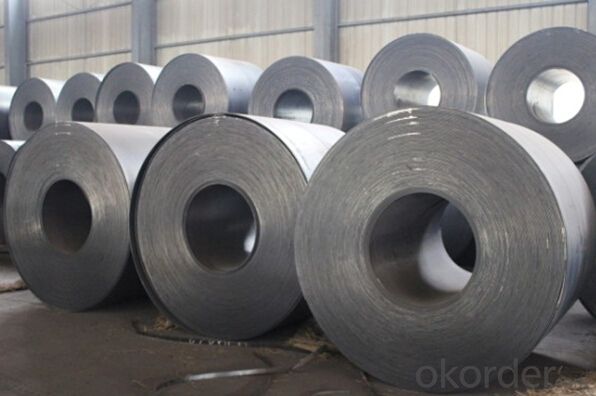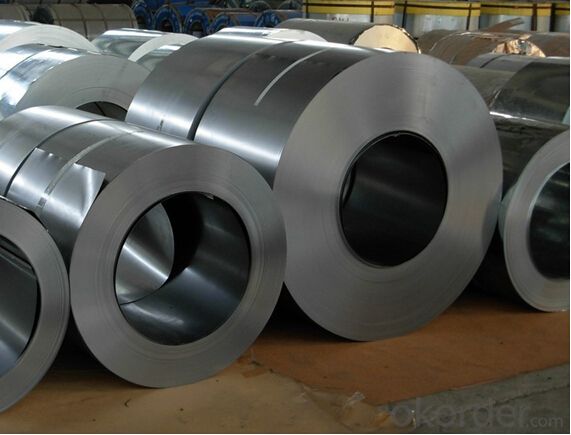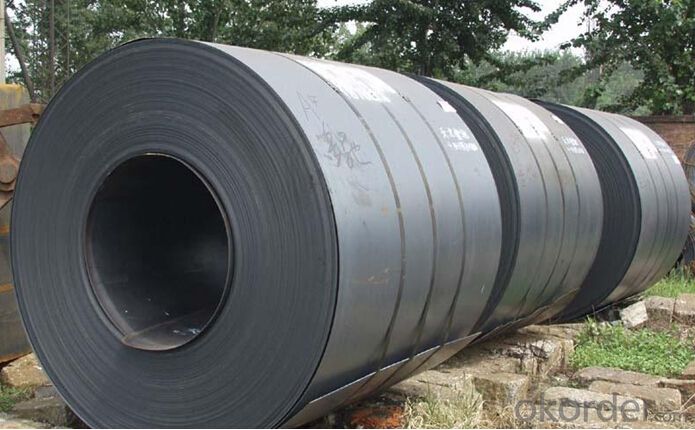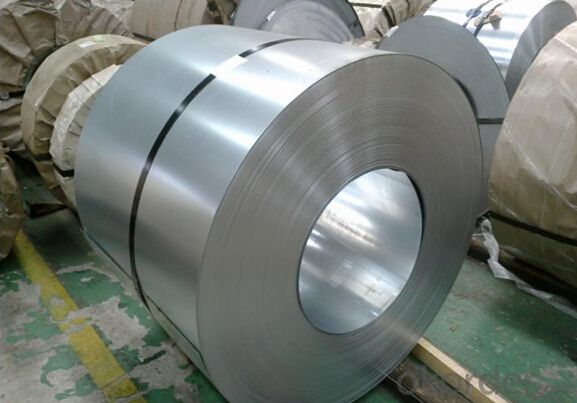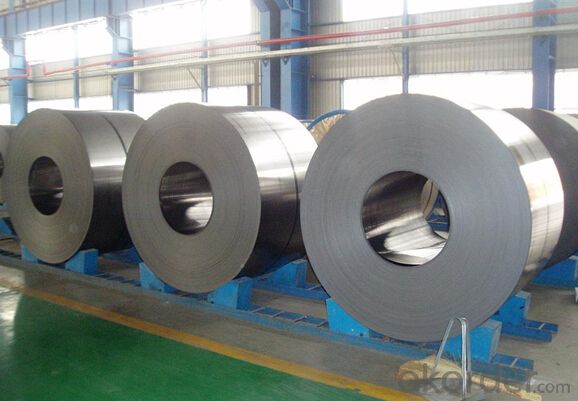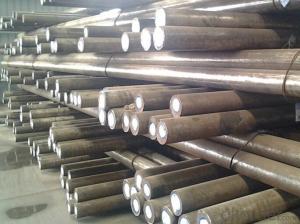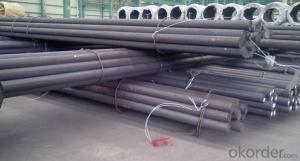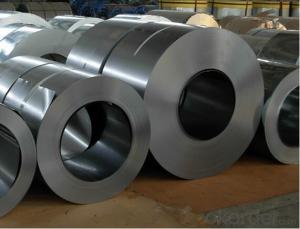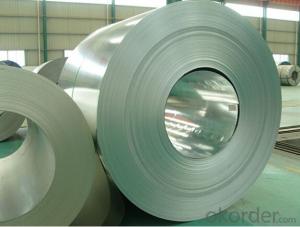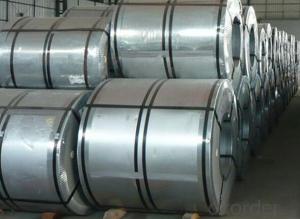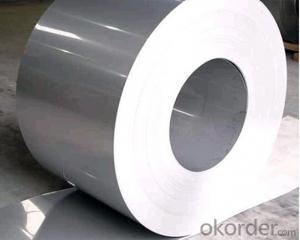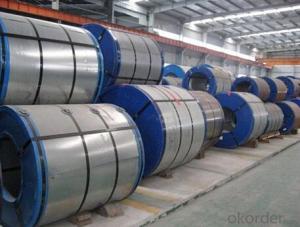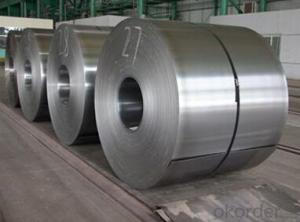Grade JIS G3135-SPFC 340 Galvanized Steel Coil
- Loading Port:
- Tianjin
- Payment Terms:
- TT OR LC
- Min Order Qty:
- 3 m.t.
- Supply Capability:
- 10000 m.t./month
OKorder Service Pledge
OKorder Financial Service
You Might Also Like
Specification
Grade JIS G3135-SPFC 340 Galvanized Steel Coil
Specification of Grade JIS G3135-SPFC 340 Galvanized Steel Coil
1. Galvanized Steel Coil
(1) Width: 600-1570mm
(2) Thickness: 0.13-5.0mm
(3) Grade: JIS G3302-SGCC-SGC570, SGCH (full hard-G550), SGHC-SGH540
EN10346-DX51D+Z, DX53D+Z, S250GD-S550GD
ASTM A653-CS-B, SS255-SS550
(4) Zinc Coating: Z40g/m2~Z500g/m2 (both side total coating thickness)
2. Galvalume Steel Coil
(1) Width: 600~1500mm
(2) Thickness: 0.15~2.30mm
(3) Grade: JIS G3321-SGLCC, SGLC400-570, (G550)
EN10346-DX51D+AZ, DX53D+AZ, S250-S550
ASTM A792M CS-B, SS255-SS550
(4) AZ Coating: AZ50~AZ185g/m2
3. Prepainted Galvanized Steel Coil (PPGI)
(1) Width: 600~1250mm
(2) Thickness: 0.19~1.50mm
(3) Grade: JIS G3312-CGCC, CGC340-570, (G550)
ASTM A755M CS-B, SS255-SS550
(4) Zinc Coating: Z40g/m2~Z500g/m2 (both side total coating thickness)
4. Prepainted Galvanized Steel Coil (PPGL)
(1) Width: 600~1250mm
(2) Thickness: 0.20~1.50mm
(3) Grade: JIS G3322-CGLCC, CGLC340-570, (G550)
ASTM A755M CS-B, SS255-SS550
(4) AZ Coating: AZ50~AZ185g/m2 (both side total coating thickness)
5. Cold Rolled Steel Coil (Soft) (for further information, pls click the product name)
(1) Width: 600~1570mm
(2) Thickness: 0.13~2.50mm
(3) Grade: JIS G3141-SPCC-SD, SPCD-SD, SPEC-SD
JIS G3135-SPFC 340/390/440
EN10130-DC01, DC03, DC04
SAE1006, SAE1008
ASTM A424-TypeⅡ
6. Cold Rolled Steel Coil (Full Hard) (for further information, pls click the product name)
(1) Width: 600~1570mm
(2) Thickness: 0.13~2.50mm
(3) Grade: JIS G3141-SPCC-1B, SPCC-1D
7. Hot Rolled Steel Coil
(1) Width: 1000~1524mm
(2) Thickness: 1.20~16.5mm, other thickness can be negotiation
(3) Grade: JIS G3101-SS400, JIS G3132-SPHT1/2/3, ASTM A36, Q195, Q235 etc.
Company Introduction of the Grade JIS G3135-SPFC 340 Galvanized Steel Coil
CNBM International Corporation is the most import and export platform of CNBM group(China National Building Material Group Corporation) ,which is a state-owned enterprise, ranked in 270th of Fortune Global 500 in 2015.
With its advantages, CNBM International are mainly concentrate on Cement, Glass, Iron and Steel, Ceramics industries and devotes herself for supplying high quality series of refractories as well as technical consultancies and logistics solution.
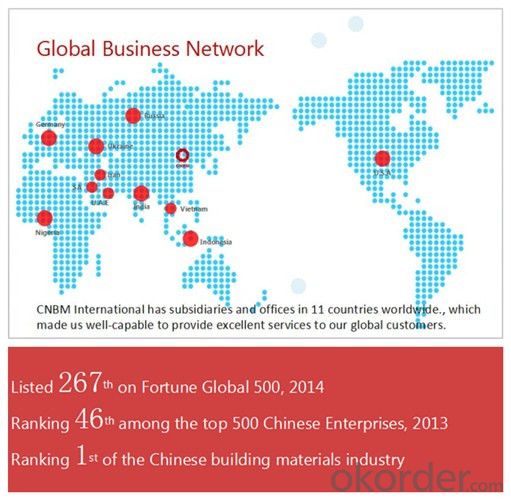
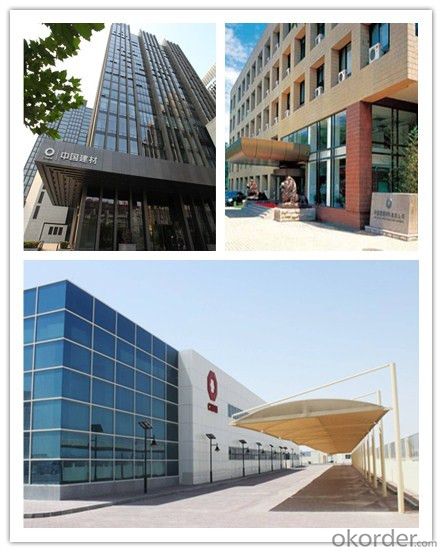
Packaging & Delivery of the Grade JIS G3135-SPFC 340 Galvanized Steel Coil
Packaging Detail | Sea worthy packing /as per customer's packing instruction |
Delivery Detail | 15 ~ 40 days after receiving the deposit |
Products Show:
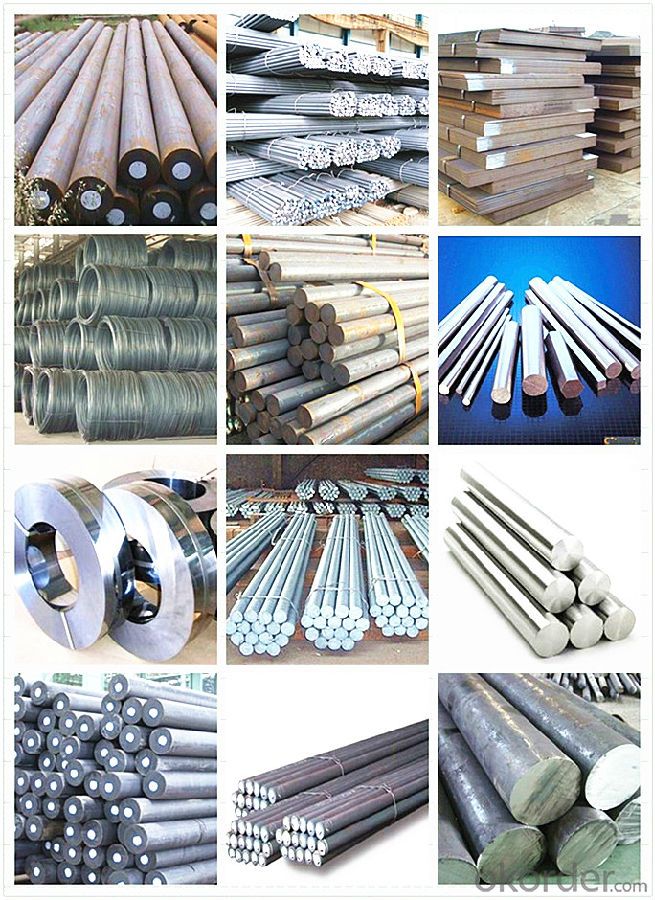
FAQ:
Are you a trading company or manufacturer? | Manufacturer |
What’s the MOQ? | 3 metric ton |
What’s your delivery time? | 15-35 days after downpayment received |
Do you Accept OEM service? | Yes |
what’s your delivery terms? | FOB/CFR/CIF |
What's the Payment Terms? | 30% as deposit,70% before shipment by T/T |
Western Union acceptable for small amount. | |
L/C acceptable for large amount. | |
Scrow ,Paybal,Alipay are also ok | |
Why choose us? | Chose happens because of quality, then price, We can give you both. Additionally, we can also offer professional products inquiry, products knowledge train (for agents), smooth goods delivery, excellent customer solution proposals. |
What's your available port of Shipment? | Main Port, China |
What’s your featured services? | Our service formula: good quality+ good price+ good service=customer's trust
|
Where are your Market? | Covering more than 160 countries in the world |
- Q: Can special steel be used in the nuclear power industry?
- Yes, special steel can be used in the nuclear power industry. Special steel, such as stainless steel or alloy steel, is often used for various components in nuclear power plants due to its high strength, corrosion resistance, and ability to withstand high temperatures and radiation. These steels are utilized in reactor vessels, steam generators, piping systems, and other critical structures to ensure the safety and reliability of nuclear power plants.
- Q: What are the limitations of using special steel in electrical applications?
- Using special steel in electrical applications comes with several limitations. Firstly, it tends to be more expensive compared to other commonly used materials like copper or aluminum, making it less cost-effective for large-scale projects. Another drawback is its relatively high electrical resistivity, which hampers its efficiency in conducting electricity. This results in higher energy losses and lower overall efficiency in electrical systems, which is particularly concerning for energy-efficient applications like power generation or transmission. Moreover, special steel lacks the malleability and ductility found in materials like copper, making it less suitable for applications requiring shaping or forming. Working with it can be more challenging and may necessitate complex manufacturing processes. Furthermore, special steel is more susceptible to corrosion compared to materials like copper or aluminum. In environments with high humidity or moisture exposure, this can significantly limit its use in electrical applications. Corrosion not only degrades the steel's electrical properties but also reduces its lifespan, leading to increased maintenance and replacement costs. Lastly, special steel may not be as readily available or easily sourced as other materials commonly used in electrical applications. This can present challenges in terms of availability, lead times, and potential disruptions in the supply chain, ultimately impacting project timelines and overall productivity.
- Q: How does special steel contribute to the aerospace defense industry?
- Special steel plays a crucial role in the aerospace defense industry by providing the necessary strength, durability, and resistance to extreme conditions that are required for various applications in aircraft and defense systems. One of the key contributions of special steel in this industry is its ability to withstand high temperatures and pressures. In aircraft engines, for example, special steel alloys are used to manufacture turbine blades and other components that are constantly exposed to extremely hot gases. These alloys have excellent heat resistance properties, allowing them to retain their strength and structural integrity even in such demanding conditions. Additionally, special steel is also highly resistant to corrosion and erosion, making it ideal for aerospace applications. Aircraft and defense systems often operate in harsh environments, including exposure to saltwater, moisture, and other corrosive elements. Special steel alloys, such as stainless steel, are used to prevent rusting and corrosion, ensuring the longevity and reliability of critical components. Moreover, special steel is used in the manufacturing of armor plates and ballistic protection systems for military vehicles and aircraft. Its high tensile strength and impact resistance make it an essential material for these applications, providing enhanced protection to military personnel and assets. Furthermore, special steel is utilized in the production of landing gears, wing components, and airframe structures. These components must withstand tremendous forces and stresses during takeoff, landing, and flight, making the strength and durability of special steel crucial for the safety and performance of aerospace systems. In summary, special steel significantly contributes to the aerospace defense industry by providing the necessary strength, durability, and resistance to extreme conditions required for various applications. Its ability to withstand high temperatures and pressures, resistance to corrosion and erosion, and high tensile strength make it an indispensable material in the manufacturing of aircraft engines, armor plates, ballistic protection systems, and other critical components.
- Q: How does copper influence the characteristics of special steel?
- The unique properties of copper and its role as an alloying element have a substantial impact on the characteristics of special steel. By adding small amounts of copper to steel, its strength, hardness, and resistance to corrosion can be enhanced. One of the notable advantages of copper in special steel lies in its ability to enhance the mechanical properties of the steel. With the addition of copper, the strength and hardness of the steel are increased, making it suitable for applications that demand high tensile strength and durability. This is particularly crucial in industries like construction, automotive, and aerospace, where sturdy and long-lasting steel is indispensable. Moreover, copper also improves the steel's resistance to corrosion. It forms a protective oxide layer on the steel's surface, preventing the formation of rust and other types of corrosion. This makes copper-infused steel ideal for use in harsh environments or applications where exposure to moisture or corrosive substances is common. Furthermore, copper can enhance the machinability of special steel. It acts as a lubricant during the machining process, reducing friction and heat generation. As a result, tool life is improved, energy consumption is reduced, and productivity is enhanced. In conclusion, the addition of copper to special steel has a significant impact on its characteristics. It improves the steel's strength, hardness, and resistance to corrosion, making it more suitable for demanding applications. Additionally, copper enhances the machinability of steel, leading to increased productivity and cost-effectiveness.
- Q: Can special steel be coated?
- Yes, special steel can be coated. Coatings can provide various benefits such as corrosion resistance, improved aesthetics, and enhanced durability to special steel.
- Q: How is special steel used in the aerospace sector?
- Special steel is extensively used in the aerospace sector due to its unique properties that make it suitable for various applications. One of the primary uses of special steel in the aerospace industry is for manufacturing aircraft engine components. These components, such as turbine blades, shafts, and casings, are subjected to extremely high temperatures, pressures, and stresses. Special steel, with its excellent heat resistance, high strength, and superior mechanical properties, enables these engine parts to withstand such harsh conditions, ensuring optimal performance and safety. Moreover, special steel is also utilized in the construction of aircraft structures, including wings, fuselage, landing gears, and other critical components. These structures need to be lightweight, yet strong enough to withstand the forces experienced during flight. Special steel alloys, such as stainless steel, are used to achieve this balance by providing excellent strength-to-weight ratios and corrosion resistance. Additionally, special steel finds application in aerospace fasteners, such as bolts, nuts, and screws. These fasteners must have exceptional strength and durability to ensure the structural integrity of the aircraft. Special steel alloys, like titanium alloys, are commonly used in this regard due to their lightweight nature, high strength, and resistance to corrosion. Furthermore, special steel is utilized in the production of aerospace tooling and equipment. These tools, such as molds, dies, jigs, and fixtures, need to be robust, wear-resistant, and capable of withstanding high temperatures and pressures during manufacturing processes. Special steel, with its excellent hardness, toughness, and heat resistance, makes it ideal for such applications. In summary, special steel plays a critical role in the aerospace sector by providing the necessary properties required for aircraft engine components, structures, fasteners, and tooling. Its unique characteristics of high strength, heat resistance, lightweight, and corrosion resistance make it an indispensable material in the production of reliable and high-performance aerospace systems.
- Q: How is high-speed tool steel used in the manufacturing of drills and taps?
- High-speed tool steel is commonly used in the manufacturing of drills and taps due to its excellent hardness, wear resistance, and ability to withstand high temperatures. This type of steel is able to retain its hardness at elevated temperatures, making it ideal for cutting tools that generate heat during operation. It enables drills and taps to effectively cut through various materials, including metal and wood, while maintaining their sharpness and durability. Additionally, high-speed tool steel allows for faster cutting speeds and increased productivity in manufacturing processes.
- Q: What are the properties of electrical resistance steel?
- Electrical resistance steel is characterized by its high resistivity, which means it offers high resistance to the flow of electric current. It also exhibits good electrical conductivity, ensuring efficient transmission of electric power. Additionally, electrical resistance steel typically has a low temperature coefficient of resistance, meaning its resistance does not change significantly with temperature fluctuations. These properties make it suitable for various applications, such as in electrical resistors, heating elements, and electrical wiring where controlled resistance and durability are required.
- Q: How does special steel perform in terms of magnetic properties?
- Special steel can exhibit a wide range of magnetic properties depending on its composition and processing. Some special steels, such as stainless steel, are generally non-magnetic or have very low magnetic permeability. However, certain types of special steel, such as tool steel or high-speed steel, can be engineered to possess magnetic properties suitable for specific applications, such as magnetic tools or electrical transformers. Overall, the magnetic properties of special steel can be tailored to meet the desired requirements for different applications.
- Q: What are the applications of high-strength low-alloy (HSLA) steel?
- High-strength low-alloy (HSLA) steel finds applications in various industries such as automotive, construction, and manufacturing. It is commonly used in the production of lightweight and durable vehicle components, structural beams, pipelines, and machinery parts. HSLA steel's enhanced strength and toughness make it ideal for applications where weight reduction, increased load-bearing capacity, and resistance to corrosion and impact are crucial.
Send your message to us
Grade JIS G3135-SPFC 340 Galvanized Steel Coil
- Loading Port:
- Tianjin
- Payment Terms:
- TT OR LC
- Min Order Qty:
- 3 m.t.
- Supply Capability:
- 10000 m.t./month
OKorder Service Pledge
OKorder Financial Service
Similar products
Hot products
Hot Searches
Related keywords
